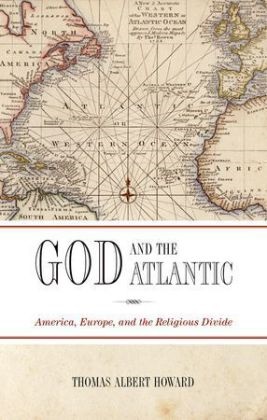Read more
Zusatztext God and the Atlantic provides an overview with impressive sweep, and it gives a vivid account of a virulent, persistent and consistent strain of European anti-Americanism. It is worth reading. Informationen zum Autor Thomas Albert Howard currently holds the Stephen Phillips Chair in history and is director of the Jerusalem & Athens Forum at Gordon College in Wenham, Massachusettes. He is the author of Religion and the Rise of Historicism and Protestant Theology and the Making of the Modern German University, winner of the Lilly Fellows Program Book Award for 2007. He is also the editor of The Future of Christian Learning: An Evangelical and Catholic Dialogue by Mark Noll and James Turner. Klappentext The first major work of cultural and intellectual history devoted to the subject of the transatlantic religious divide. Using nineteenth and early twentieth century commentary on the subject, Howard helps us understand why Americans have maintained much friendlier ties with traditional forms of religion than their European counterparts. Zusammenfassung Since the eighteenth-century Enlightenment, the United States and Western Europe's paths to modernity have diverged sharply with respect to religion. In short, Americans have maintained much friendlier ties with traditional forms of religion than their European counterparts. What explains this transatlantic religious divide?Accessing the topic though nineteenth and early twentieth-century European commentary on the United States, Thomas Albert Howard argues that an 'Atlantic gap' in religious matters has deep and complex historical roots, and enduringly informs some strands of European disapprobation of the United States. While exploring in the first chapters 'Old World' disquiet toward the young republic's religious dynamics, the book turns in the final chapters and focuses on more constructive European assessments of the United States. Acknowledging the importance of Alexis de Tocqueville for the topic, Howard argues that a widespread overreliance on Tocqueville as interpreter of America has had a tendency to overshadow other noteworthy European voices. Two underappreciated figures here receive due attention: the Protestant Swiss-German church historian, Philip Schaff, and the French Catholic philosopher, Jacques Maritain.While the transatlantic religious divide has received commentary from journalists and sociologists in recent decades, this is the first major work of cultural and intellectual history devoted to the subject. Inhaltsverzeichnis 1: Introduction I 2: The Traditionalist Critique: A "Ranting and Raving Tumult " 3: The Secularist Critique: "A Certain Backwardness of Thought " II 4: Philip Schaff: Herr Doktor Professor in the American Frontier 5: Jacques Maritain: A French Thomist and the New World 6: Conclusion: The Double Helix and the Dialectic ...

